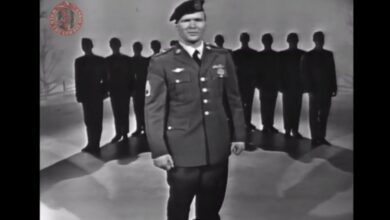Elvis and Lisa Marie’s “Don’t Cry Daddy” is a poignant duet that tugs at the heartstrings.
“Don’t Cry Daddy,” a moving country ballad sung by Elvis Presley in 1969, was penned by the talented Mac Davis. The song narrates a heartfelt tale of a father’s efforts to comfort his children following the heartbreaking loss of their mother. As listeners journey through the father’s emotional struggles, they witness his attempts to cope with his own grief while supporting his children. Elvis’s poignant and soulful performance deepens the song’s themes of loss, sorrow, and resilience, striking a chord with audiences everywhere. The universal emotional themes explored in “Don’t Cry Daddy” highlight the profound bond between parents and children, especially in times of tremendous pain.
Elvis Aaron Presley, famously known as the King of Rock ‘n’ Roll, was born on January 8, 1935, in Tupelo, Mississippi. His career soared in the mid-1950s, heralding a transformative era in music. Presley’s unique blend of rhythm and blues, gospel, and country created a sound that resonated widely. He was celebrated for his magnetic performances, distinctive voice, and significant cultural influence, which ultimately revolutionized popular music. Though he is often associated with rock and roll, his extensive repertoire reflects a remarkable versatility that spans various genres. “Don’t Cry Daddy,” with its country roots, exemplifies his diverse artistic talent.
The emotional impact of “Don’t Cry Daddy” was further enriched by its posthumous version featuring Lisa Marie Presley, released in 1997. This exceptional collaboration employed advanced digital technology to merge Lisa Marie’s vocals with those of her father, resulting in a distinct musical experience that bridges the past and present. Their harmonious voices serve as a touching reminder of their familial bond and Elvis’s lasting musical legacy. Additionally, this duet highlights how technology can connect generations, offering fresh interpretations of classic songs while preserving their emotional essence.
Lisa Marie Presley, born on February 1, 1968, also ventured into the music scene, creating her own path as a singer and songwriter. While she lived much of her life in the shadow of her father’s immense legacy, Lisa Marie successfully forged a unique artistic identity. Her involvement in the duet of “Don’t Cry Daddy” brought a personal touch to the original, infusing it with new emotions that mirror her own experiences of grief and healing. Her contribution not only showcases her admiration for her father’s work but also her desire to carry on the conversations he initiated through his music.
Crafting this duet was a complex process. Producers utilized advanced digital audio technology to blend Lisa Marie’s voice with Elvis’s original track. This careful editing demanded meticulous attention to detail to ensure that the harmony between the two artists felt genuine while honoring their distinct styles. The result is a hauntingly beautiful rendition that speaks to listeners on multiple emotional levels. This blend of innovative technology and artistic creativity exemplifies the music industry’s evolution while honoring its roots.
As “Don’t Cry Daddy” continues to be celebrated and performed, it stands as a testament to the power of music to evoke deep emotions and establish timeless connections. The collaborative version between father and daughter enriches the narrative of the song, allowing new audiences to engage with its themes in fresh and meaningful ways. It serves as a poignant reminder of how powerful collaborations can shape interpretations, underscoring the lasting nature of great music.
The legacy of “Don’t Cry Daddy” pays tribute to its original creator and to Elvis Presley’s unique impact, which continues to resonate within the music industry today. The song has become emblematic of the emotional storytelling intrinsic to country music, intertwining themes of love, loss, and hope. The duet with Lisa Marie further amplifies this narrative, demonstrating the profound connections that family can foster through artistic expression.
In conclusion, the posthumous duet of “Don’t Cry Daddy” powerfully reflects both the original song’s emotional depth and the legacy of Elvis Presley. It encapsulates timeless themes of family, loss, and healing that resonate deeply in the human experience. By intertwining the voices of father and daughter, this rendition invites listeners into a deeply personal and nostalgic journey that honors the past while anticipating the future. Ultimately, “Don’t Cry Daddy” remains a pivotal piece of music history, illustrating the lasting influence of Elvis’s artistry and the innovative potential of modern technology to preserve and revitalize classic works for new generations.





